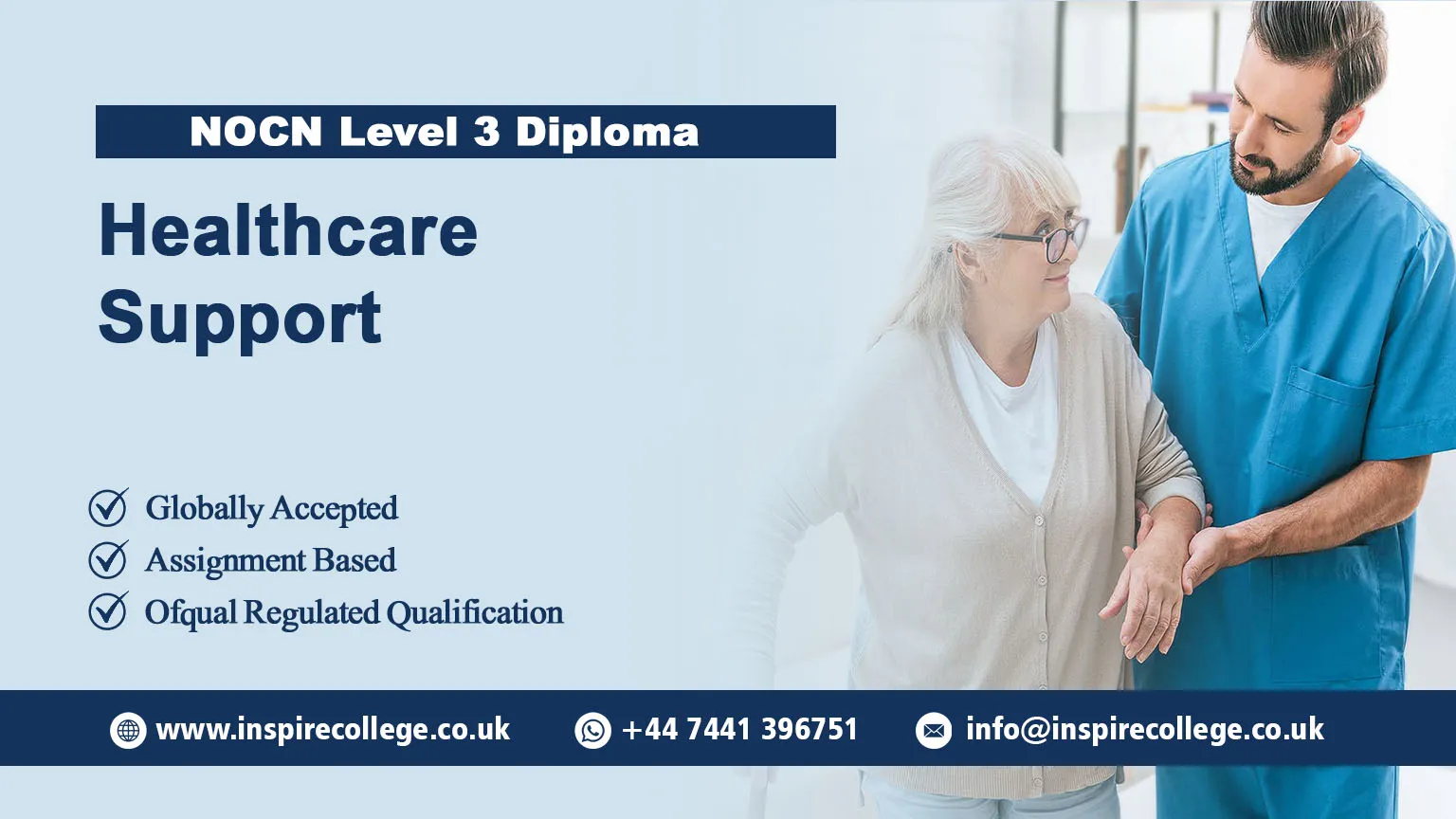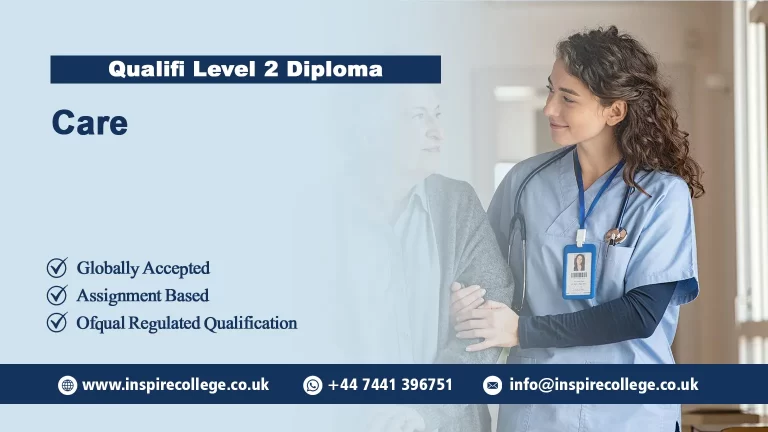
NOCN Level 3 Diploma in Healthcare Support
Unlock Your Path to a Rewarding Healthcare Career with the NOCN Level 3 Diploma in Healthcare Support!
The NOCN Level 3 Diploma in Healthcare Support is a highly regarded qualification designed for individuals working in healthcare roles who are looking to enhance their skills and advance their careers. This diploma offers essential training that equips learners with the practical skills and knowledge necessary to provide exceptional care in various healthcare settings, from hospitals and nursing homes to clinics and community health services.
This qualification is ideal for individuals already employed in healthcare support roles, such as Healthcare Assistants, Support Workers, or Clinical Support Workers. The diploma provides formal recognition of the skills developed on the job and is designed for those who wish to deepen their understanding of patient care and improve their career prospects. For employers, the NOCN Level 3 Diploma ensures that their staff are well-trained, competent, and up-to-date with the latest healthcare standards.
The NOCN Level 3 Diploma in Healthcare Support covers a broad range of topics essential for delivering quality healthcare services. These include patient care, infection control, communication skills, safeguarding vulnerable adults and children, promoting health and well-being, and providing support for individuals with complex needs. Learners will also gain insight into person-centered care, ensuring that patients’ needs, values, and preferences are always respected.
One of the key benefits of the NOCN Level 3 Diploma is its flexible delivery format. The diploma can be pursued through a combination of on-the-job training, online learning, and classroom-based instruction, allowing learners to balance their professional and personal commitments. This flexibility makes it an attractive option for those who are already employed in healthcare settings but wish to improve their qualifications without sacrificing work or family time.
Upon completing the NOCN Level 3 Diploma in Healthcare Support, individuals can pursue various career opportunities. The qualification is a stepping stone to more advanced roles, such as Senior Healthcare Support Worker, Assistant Practitioner, or even further studies, such as a Foundation Degree in healthcare. Additionally, this diploma can be an excellent pathway for individuals considering training as a Registered Nurse or other specialist roles within the healthcare industry.
For individuals aiming to progress in their healthcare careers, the NOCN Level 3 Diploma provides a structured and comprehensive learning pathway. Not only does it enhance practical skills, but it also provides formal recognition, increasing employability and the potential for career advancement. By completing this diploma, healthcare professionals will be better equipped to meet the challenges of today’s healthcare environment, where high-quality, compassionate care is always a priority.
The NOCN Level 3 Diploma in Healthcare Support is an excellent qualification for healthcare workers looking to elevate their skills, gain formal recognition, and open up new career opportunities. With its flexible learning options and industry alignment, this diploma is a worthwhile investment in any healthcare professional’s future.
Enroll in our NOCN Level 3 Diploma in Healthcare Support today, and seize the opportunity to become an exceptional healthcare professional. As you embark on this transformative journey, you’ll not only gain valuable qualifications but also discover the immense joy of providing compassionate care to those in need.
To enroll in the “NOCN Level 3 Diploma in Healthcare Support” course, prospective learners must meet the following entry requirements:
- Age Requirement: Learners must be at least 18 years old at the time of enrollment.
- Basic Language Proficiency: Proficiency in English language skills is essential, as the course materials, assessments, and communication will be conducted primarily in English.
- Educational Background: There are no specific academic qualifications required for entry into this course. Learners from diverse educational backgrounds are welcome to apply.
- Genuine Interest in Healthcare: Prospective learners should have a genuine interest in the healthcare sector and a passion for providing care and support to patients.
- Empathy and Compassion: The course involves patient care, so learners must possess empathy, compassion, and a patient-centered approach to healthcare.
- Physical and Emotional Suitability: Due to the nature of the course, learners should be physically and emotionally suitable to carry out healthcare support duties, including providing personal care to patients.
- Access to Healthcare Setting: Learners need access to a suitable healthcare setting or environment where they can gain hands-on experience and apply their learning in practical situations.
- Commitment to Learning: Enrolling in the course requires a strong commitment to learning, as learners will be expected to engage actively in the curriculum and assessments.
Mandatory Units
Units
| Sr# | Units Titles | Credit Value |
|---|---|---|
| 1 | Adapt and fit healthcare equipment, medical devices, assistive technology, or products, to meet individuals’ needs | 6 |
| 2 | Administer medication to individuals and monitor the effects | 5 |
| 3 | Administer oral nutritional products to individuals | 4 |
| 4 | Advise and inform individuals on managing their condition | 5 |
| 5 | Anatomy and Physiology for Maternity Support Workers | 2 |
| 6 | Assist and support individuals to use alternative and augmentative communication systems (AAC) | 5 |
| 7 | Assist in implementing treatment programmes for individuals with severely reduced movement/mobility | 5 |
| 8 | Assist in planning and evaluating learning activities | 3 |
| 9 | Assist in receiving, handling and dispatching clinical specimens | 2 |
| 10 | Assist in testing individuals’ abilities prior to planning physical activities | 5 |
| 11 | Assist in the administration of oxygen | 5 |
| 12 | Assist in the delivery of perioperative care and support to individuals | 4 |
| 13 | Assist in the implementation of programmes to increase mobility, movement and functional independence | 4 |
| 14 | Assist individuals who have mental health problems when they are transferring between agencies and services | 2 |
| 15 | Assist others to monitor individuals’ progress in managing dysphagia | 5 |
| 16 | Assist others to plan presentations | 2 |
| 17 | Assist professionals to support individuals from diverse linguistic and cultural backgrounds to access speech and language therapy services | 5 |
| 18 | Assist the practitioner to carry out health care activities | 2 |
| 20 | Awareness of the Mental Capacity Act 2005 | 3 |
| 21 | Care for a newborn baby | 4 |
| 22 | Care for individuals with naso-gastric tubes | 3 |
| 23 | Care for individuals with urethral catheters | 4 |
| 24 | Care for the elderly | 2 |
| 25 | Care for the physical and nutritional needs of babies and young children | 6 |
| 26 | Carry out arterial puncture and collect arterial blood | 4 |
| 27 | Carry out blood collection from fixed or central lines | 4 |
| 28 | Carry out intravenous infusion | 4 |
| 29 | Carry out vision screening | 4 |
| 30 | Carry out wound drainage care | 4 |
| 31 | Causes and Spread of Infection | 2 |
| 32 | Cleaning, Decontamination and Waste Management | 2 |
| 33 | Collaborate in the assessment of environmental and social support in the community | 4 |
| 34 | Collate and communicate health information to individuals | 2 |
| 35 | Communicate with children and young people in care settings | 4 |
| 36 | Communicate with individuals about promoting their health and wellbeing | 3 |
| 37 | Conduct External Ear Examinations | 4 |
| 38 | Conduct hearing assessments | 4 |
| 39 | Conduct routine maintenance on clinical equipment | 4 |
| 40 | Contribute to monitoring the health of individuals affected by health conditions | 2 |
| 41 | Contribute to the discharge of individuals to carers | 3 |
| 42 | Contribute to the effectiveness of teams | 2 |
| 43 | Contribute to the safe use of medical devices in the perioperative environment | 4 |
| 44 | Control the use of physical resources in a health setting | 3 |
| 45 | Coordinate the progress of individuals through care pathways | 4 |
| 46 | Deliver exercise sessions to improve individuals’ health and wellbeing | 5 |
| 47 | Deliver training through demonstration and instruction | 3 |
| 48 | Dementia Awareness | 2 |
| 49 | Develop activities and materials to enable individuals to reach specific communication goals | 5 |
| 50 | Develop and agree individualised care plans for babies and families | 5 |
| 51 | Develop and prepare speech and language therapy resources for alternative and augmentative communication (AAC) use | 4 |
| 52 | Develop positive relationships with children and young people | 4 |
| 53 | Duty of care in care settings | 1 |
| 54 | Effective communication and building relationships in mental health work | 5 |
| 55 | Enable children and young people to understand their health and well-being | 5 |
| 56 | Enable individuals to develop strategies to manage their behaviour | 8 |
| 57 | Enable individuals with mental health problems to develop alternative coping strategies | 4 |
| 58 | Enable mental health service users and carers to manage change | 3 |
| 59 | End of life and dementia care | 2 |
| 60 | Examine the feet of individuals with diabetes | 3 |
| 61 | Facilitate and monitor housing and accommodation services to support individuals with mental health needs | 5 |
| 62 | Facilitate learning and development activities to meet individual needs and preferences | 5 |
| 63 | Give presentations to groups | 4 |
| 64 | Human Structure and Functionality | 8 |
| 65 | Implement hydrotherapy programmes for individuals and groups | 5 |
| 66 | Implement therapeutic group activities | 4 |
| 67 | Inform an individual of discharge arrangements | 2 |
| 68 | Insert and secure nasogastric tubes | 4 |
| 69 | Interact with and support individuals using telecommunications | 5 |
| 70 | Maintaining quality standards in the health sector | 2 |
| 71 | Make recommendations for the use of physical resources in a health setting | 4 |
| 72 | Manage the availability of physical resources to meet service delivery needs in a health setting | 5 |
| 73 | Managing symptoms in end of life care | 4 |
| 74 | Manufacture equipment or medical devices for individuals within healthcare | 4 |
| 75 | Measure and record individuals’ body fluid balance in a perioperative environment | 4 |
| 76 | Monitor and maintain the environment and resources during and after health care activities | 3 |
| 77 | Monitor and review individuals’ progress in relation to maintaining optimum nutritional status | 3 |
| 78 | Monitor individuals’ progress in relation to managing their body weight and nutrition | 3 |
| 79 | Move and position individuals in accordance with their care plan | 4 |
| 80 | Obtain a client history | 3 |
| 81 | Obtain and test capillary blood samples | 4 |
| 82 | Obtain and test specimens from individuals | 2 |
| 83 | Obtain venous blood samples | 3 |
| 84 | Operate equipment for intraoperative cell salvage blood collection | 5 |
| 85 | Operate equipment for intraoperative cell salvage blood processing and complete intraoperative cell salvage blood process | 5 |
| 86 | Perform first line calibration on clinical equipment to ensure it is fit for use | 3 |
| 87 | Perform intravenous cannulation | 5 |
| 88 | Perform routine electrocardiograph (ECG) procedures | 4 |
| 89 | Perform the non-scrubbed circulating role for perioperative procedures | 3 |
| 90 | Prepare anaesthetic environment and provide support for pre and post operative anaesthesia and recovery | 5 |
| 91 | Prepare and apply dressings and drains to individuals in the perioperative environment | 2 |
| 92 | Prepare and dress for scrubbed clinical roles | 4 |
| 93 | Prepare and provide surgical instrumentation and supplementary items for the surgical team | 6 |
| 94 | Prepare equipment for intraoperative cell salvage blood collection | 2 |
| 95 | Prepare equipment for intraoperative cell salvage blood processing | 4 |
| 96 | Prepare for and carry out extended feeding techniques | 4 |
| 97 | Prepare individuals for healthcare activities | 2 |
| 98 | Principles of Health Promotion | 2 |
| 99 | Promote communication in care settings | 3 |
| 100 | Promote effective handling of information in care settings | 2 |
| 101 | Promote equality and inclusion in care settings | 2 |
| 102 | Promote health, safety and wellbeing in care settings | 6 |
| 103 | Promote person-centred approaches in care settings | 6 |
| 104 | Promote Positive Behaviour | 6 |
| 105 | Promotion of General Health and Well-being | 2 |
| 106 | Provide advice and information to enable parents to promote the health and well-being of their newborn babies | 3 |
| 107 | Provide advice on foot care for individuals with diabetes | 4 |
| 108 | Provide agreed support for foot care | 3 |
| 109 | Provide information and advice to individuals on eating to maintain optimum nutritional status | 5 |
| 110 | Provide support for individuals with communication and interaction difficulties | 5 |
| 111 | Provide support for leisure activities | 3 |
| 112 | Provide support for mobility | 2 |
| 113 | Provide support for sleep | 2 |
| 114 | Provide support to individuals to continue recommended therapies | 3 |
| 115 | Provide support to maintain and develop skills for everyday life | 4 |
| 116 | Provide support to manage pain and discomfort | 2 |
| 117 | Provide support to the surgical team when preparing individuals for operative and invasive procedures | 4 |
| 118 | Receive and handle clinical specimens within the sterile field | 4 |
| 119 | Recognise indications of substance misuse and refer individuals to specialists | 4 |
| 120 | Remove wound closure materials | 3 |
| 121 | Remove wound drains | 4 |
| 122 | Reprocess endoscopy equipment | 4 |
| 123 | Responsibilities of a care worker | 2 |
| 124 | Safeguarding and protection in care settings | 3 |
| 125 | Select and wear appropriate personal protective equipment for work in healthcare settings | 2 |
| 126 | Service improvement in the health sector | 3 |
| 127 | Support carers to meet the care needs of individuals | 4 |
| 128 | Support Child and Young Person Development | 3 |
| 129 | Support children and young people experiencing transitions | 3 |
| 130 | Support children and young people with additional needs | 6 |
| 131 | Support children and young people with mental health conditions | 5 |
| 132 | Support independence in the tasks of daily living | 5 |
| 133 | Support individuals at the end of life | 6 |
| 134 | Support individuals during a period of change | 4 |
| 135 | Support individuals during emergency situations | 3 |
| 136 | Support individuals during the last days of life | 5 |
| 137 | Support individuals in undertaking their chosen activities | 4 |
| 138 | Support individuals to access and manage direct payments | 4 |
| 139 | Support individuals to access and use information about services and facilities | 3 |
| 140 | Support individuals to access and use services and facilities | 4 |
| 141 | Support individuals to access education, training or employment | 4 |
| 142 | Support individuals to access housing and accommodation services | 4 |
| 143 | Support individuals to carry out their own health care procedures | 2 |
| 144 | Support individuals to develop and run support groups | 3 |
| 145 | Support individuals to eat and drink | 2 |
| 146 | Support individuals to live at home | 4 |
| 147 | Support individuals to manage continence | 3 |
| 148 | Support individuals to manage dysphagia | 5 |
| 149 | Support individuals to manage their finances | 3 |
| 150 | Support individuals to manage their own recovery from mental health problems | 3 |
| 151 | Support Individuals to Meet Personal Care Needs | 2 |
| 152 | Support individuals to prepare for and settle in to new home environments | 3 |
| 153 | Support individuals undergoing healthcare activities | 3 |
| 154 | Support individuals who are bereaved | 4 |
| 155 | Support individuals who are distressed | 3 |
| 156 | Support individuals with cognition or learning difficulties | 5 |
| 157 | Support individuals with feeding babies | 4 |
| 158 | Support Individuals With Specific Communication Needs | 5 |
| 159 | Support individuals with speech and language disorders to develop their communication skills | 4 |
| 160 | Support parents or carers to interact with and care for their newborn baby | 4 |
| 161 | Support parents/carers and those in a parental role to care for babies during their first year | 5 |
| 162 | Support positive risk taking for individuals | 4 |
| 163 | Support the spiritual wellbeing of individuals | 3 |
| 164 | Supporting individuals with loss and grief before death | 2 |
| 165 | The Principles of Infection Prevention and Control | 3 |
| 166 | Transport, transfer and position individuals and equipment within the perioperative environment | 5 |
| 167 | Understand Advance Care Planning | 3 |
| 168 | Understand care and support planning and risk management in mental health | 4 |
| 169 | Understand Child and Young Person Development | 4 |
| 170 | Understand end of life care for individuals with specific health needs | 4 |
| 171 | Understand How to Safeguard the Wellbeing of Children and Young People | 3 |
| 172 | Understand Long Term Conditions and Frailty | 3 |
| 173 | Understand mental health and behaviour management of children and young people | 4 |
| 174 | Understand mental health interventions | 4 |
| 175 | Understand mental health problems | 3 |
| 176 | Understand mental well-being and mental health promotion | 3 |
| 177 | Understand risk management in the paediatric mental health setting | 3 |
| 178 | Understand the administration of Medication | 3 |
| 179 | Understand the context of supporting individuals with learning disabilities | 4 |
| 180 | Understand the legal, policy and service framework in mental health | 5 |
| 181 | Understand the process and experience of dementia | 3 |
| 182 | Understanding Suicide Interventions | 6 |
| 183 | Undertake agreed pressure area care | 4 |
| 184 | Undertake personal hygiene activities with individuals | 3 |
| 185 | Undertake physiological measurements | 3 |
| 186 | Undertake stoma care | 4 |
| 187 | Undertake tissue viability risk assessments | 3 |
| 188 | Undertake treatments and dressings of lesions and wounds | 4 |
| 189 | Undertake urethral catheterisation processes | 4 |
| 190 | Work in partnership with families to support individuals | 3 |
| 191 | Work with babies and young children to support their development and learning | 6 |
Learning Outcomes of NOCN Level 3 Diploma in Healthcare Support
The NOCN Level 3 Diploma in Healthcare Support is designed to equip learners with the skills and knowledge required to provide effective and compassionate support to individuals in various healthcare settings. Below are the key learning outcomes for each unit of the course:
1. Promote Person-Centered Care
- Understand the principles of person-centered care and how to apply them in practice.
- Develop the ability to create, implement, and review individual care plans that meet the specific needs and preferences of patients.
- Ensure that personal dignity and respect are maintained during the delivery of care.
2. Support Communication and Information Sharing
- Demonstrate the ability to use appropriate communication techniques to support individuals and their families.
- Understand the importance of confidentiality and apply the principles of information sharing in line with legal and ethical standards.
- Utilize verbal, non-verbal, and written communication to effectively convey and receive information in a healthcare setting.
3. Understand Health and Safety in Healthcare
- Identify and assess health and safety risks within a healthcare environment.
- Understand and adhere to health and safety legislation relevant to healthcare settings.
- Promote a safe working environment by implementing safety procedures and ensuring compliance with protocols.
4. Support Individuals with Daily Living
- Assist individuals with daily personal care tasks, including bathing, dressing, feeding, and mobility.
- Provide support with nutrition and hydration, ensuring individuals receive the appropriate assistance based on their needs.
- Implement strategies to maintain and improve individuals’ independence as much as possible.
5. Contribute to the Protection of Vulnerable Individuals
- Recognize signs of abuse, neglect, or exploitation and understand the procedures for reporting concerns.
- Apply the safeguarding procedures to protect vulnerable individuals in healthcare settings.
- Promote a culture of respect and dignity to ensure the well-being of all individuals under your care.
6. Promote Health and Well-being
- Develop and implement strategies to promote physical and emotional well-being in individuals receiving care.
- Support individuals in managing their mental health and emotional needs, ensuring their psychological well-being is prioritized.
- Encourage and facilitate participation in health-promoting activities that enhance the overall quality of life for individuals.
7. Support Equality, Diversity, and Inclusion
- Understand and respect the principles of equality, diversity, and inclusion in healthcare.
- Challenge discriminatory practices and promote an environment where all individuals feel valued and respected.
- Provide support in a way that takes into account the cultural, religious, and personal preferences of individuals.
8. Provide Support to Individuals with Specific Healthcare Needs
- Gain knowledge on how to support individuals with specific healthcare conditions such as dementia, physical disabilities, or long-term illnesses.
- Understand the importance of person-centered care in supporting individuals with unique healthcare needs.
- Implement interventions that promote the well-being and independence of individuals with specific needs.
9. Contribute to Teamwork and Care Planning
- Work collaboratively within a healthcare team, ensuring that care plans are followed and updated regularly.
- Develop effective relationships with colleagues to provide integrated care for individuals.
- Participate in team meetings and reviews to assess and improve care plans and delivery.
10. Develop Professional Knowledge and Skills
- Enhance personal skills and knowledge related to healthcare through reflective practice and professional development.
- Demonstrate the ability to work in a professional, ethical, and compassionate manner at all times.
- Actively engage in learning opportunities to stay updated on current healthcare practices and innovations.
The “NOCN Level 3 Diploma in Healthcare Support” course is ideal for individuals who aspire to pursue a rewarding and fulfilling career in the healthcare sector. This comprehensive program is designed to cater to the following groups of individuals:
- Aspiring Healthcare Professionals: The course is perfect for those who dream of making a positive impact on people’s lives through healthcare support. Whether you are starting your journey in the healthcare field or seeking a career change, this diploma equips you with the necessary knowledge and skills to excel in the industry.
- Compassionate Caregivers: If you possess a natural inclination to care for others and have a compassionate nature, this course will enable you to channel your empathy and dedication into a fulfilling career path within the healthcare sector.
- Healthcare Support Workers: For individuals currently working in healthcare support roles, this course provides an excellent opportunity to enhance your qualifications and advance your career. It equips you with valuable skills and a recognized diploma to open doors to new opportunities within the healthcare industry.
- Personal and Home Care Assistants: If you are currently providing personal or home care assistance to individuals and desire to formalize your skills and expertise, this course validates your abilities and prepares you for career growth in healthcare support.
- Career Changers: The course welcomes individuals from diverse backgrounds who are keen to transition into the healthcare sector. It provides a comprehensive foundation in healthcare practices, empowering career changers to confidently embark on a new path in patient care.
- Healthcare Enthusiasts: Whether you are a recent high school graduate or simply enthusiastic about healthcare, this course caters to your passion and offers an entry point into a fulfilling and impactful career in the healthcare industry.
- Support Workers in Medical Settings: If you are already working as a support worker in medical settings, this course enables you to expand your knowledge, develop new competencies, and increase your professional value in the healthcare sector.
The “NOCN Level 3 Diploma in Healthcare Support” course is inclusive and accessible to learners from various backgrounds, united by their genuine desire to contribute to the well-being of patients and provide essential support within the healthcare domain. Whether you are driven by compassion, career aspirations, or a deep commitment to patient care, this course serves as a stepping stone towards becoming a skilled and valued healthcare support professional.
Register Now
FAQs for NOCN Level 3 Diploma in Healthcare Support






